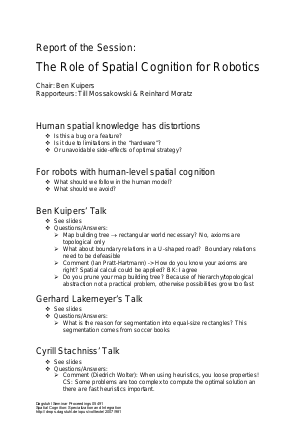05491 Report of the Session: The Role of Spatial Cognition for Robotics
Author Benjamin Kuipers
-
Part of:
Volume:
Dagstuhl Seminar Proceedings, Volume 5491
Part of: Series: Dagstuhl Seminar Proceedings (DagSemProc) - License:
 Creative Commons Attribution 4.0 International license
Creative Commons Attribution 4.0 International license
- Publication Date: 2007-04-25
File

PDF
DagSemProc.05491.3.pdf
- Filesize: 194 kB
- 5 pages
Document Identifiers
Subject Classification
Keywords
- Spatial Semantic Hierarchy
- cognitive map
- robot exploration
- map learning
Metrics
- Access Statistics
-
Total Accesses (updated on a weekly basis)
0Document
0Metadata
Abstract
There are many well-documented peculiarities of human spatial cognition. Are these simply limitations of the human mind and brain, and the design for an intelligent robot should ignore or avoid them? Or are they unavoidable trade-offs in optimal strategies for solving the spatial problems faced by an autonomous agent? In our work on the Spatial Semantic Hierarchy (SSH), we take the latter position, focusing on the ability to express incomplete knowledge of space. At the Control level, the agent selects and follows control laws to define a discrete set of distinctive states within the continuous environment. These states, along with actions abstracting the control laws linking them, form the Causal level of the SSH. From this, we derive the Topological level, which describes the environment qualitatively in terms of places, paths, and regions, related by connectivity, order, and containment. The Hybrid SSH generalizes previous work by building local metrical maps directly from perceptual information, and by building global metrical maps on the skeleton provided by the global topological map. By having multiple representations for these kinds of incomplete spatial knowledge, we hope that the Spatial Semantic Hierarchy will contribute to understanding robustness and scalability of human spatial cognition. Papers and other information can be obtained at http://www.cs.utexas.edu/~qr/robotics/.
Cite As Get BibTex
Benjamin Kuipers. 05491 Report of the Session: The Role of Spatial Cognition for Robotics. In Spatial Cognition: Specialization and Integration. Dagstuhl Seminar Proceedings, Volume 5491, pp. 1-5, Schloss Dagstuhl – Leibniz-Zentrum für Informatik (2007)
https://doi.org/10.4230/DagSemProc.05491.3
BibTex
@InProceedings{kuipers:DagSemProc.05491.3,
author = {Kuipers, Benjamin},
title = {{05491 Report of the Session: The Role of Spatial Cognition for Robotics}},
booktitle = {Spatial Cognition: Specialization and Integration},
pages = {1--5},
series = {Dagstuhl Seminar Proceedings (DagSemProc)},
ISSN = {1862-4405},
year = {2007},
volume = {5491},
editor = {Anthony G. Cohn and Christian Freksa and Bernhard Nebel},
publisher = {Schloss Dagstuhl -- Leibniz-Zentrum f{\"u}r Informatik},
address = {Dagstuhl, Germany},
URL = {https://drops.dagstuhl.de/entities/document/10.4230/DagSemProc.05491.3},
URN = {urn:nbn:de:0030-drops-9819},
doi = {10.4230/DagSemProc.05491.3},
annote = {Keywords: Spatial Semantic Hierarchy, cognitive map, robot exploration, map learning}
}
